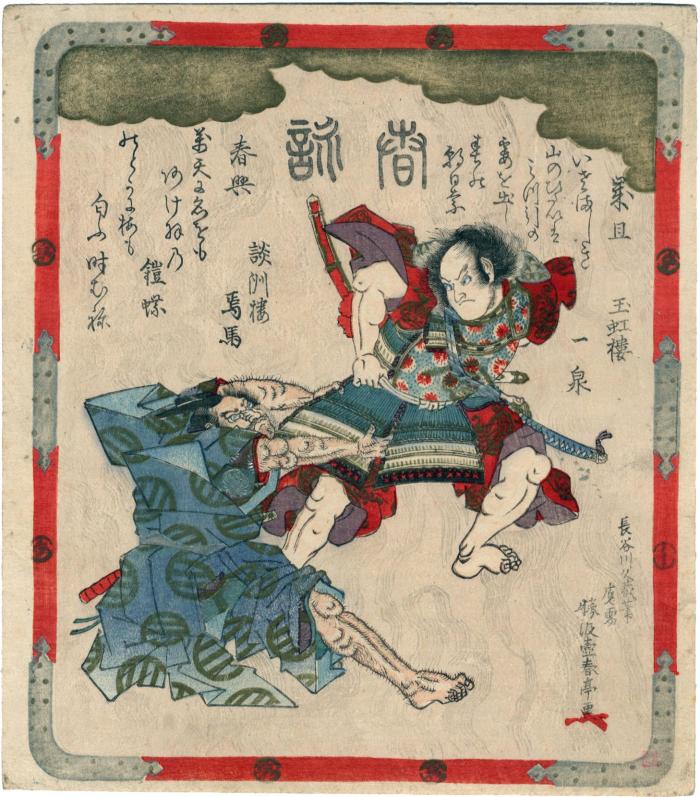Katsukawa Shuntei (勝川春亭) (artist 1770 – 1820)
'Spring Poems' (春詠): surimono of votive painting of Asahina pulling the armor of Soga no Gorō
1810s
7.25 in x 8.25 in (Overall dimensions) Japanese woodblock print
Signed:
Hasegawa Kyūzō hitsu ōju Katsu Kyūko Shuntei ga
長谷川派筆應需[katsu]春亭画
Artist's seal: kakihan (書判 - a signature or written seal at the end of a document)
Museum of Fine Arts, Boston - dated to ca. 1819-20
Nationaal Museum van Wereldculturen (Rijksmuseum Volkenkunde, Leiden) via Ritsumeikan University
Chester Beatty Library "One day Soga no Gorō fell asleep and dreamed that his brother, Jūrō, was in great danger. He flung on armour, commandeered a horse, seized a radish for a whip and galloped to the coastal town of Ōiso. Jūrō was attending a banquet at the mansion of a feudal lord named Wada, together with the brothers' sworn enemy, Kudō /Suketsune. When he arrived, Gorō saw that his brother was in no immediate danger. However, realizing their enemy was indeed present, he rushed towards the banqueting hall to carry out their revenge, an act that would have violated the unwritten feudal etiquette of vengeance. Fortunately, Gorō was stopped at the door by Kobayashi Asaina (or Asahina), one of his enemy's retainers, who was secretly sympathetic to the boys' cause. Asaina seized the skirts of Gorō's amour as the youth pushed past and the two had a fierce tug-of-war, which ended in an impasse. The scene, which is called kusazuribiki, 'armour-pulling', is extremely popular in the kabuki theatre and has been the subject of many woodblock prints.
Shuntei's surimono is designed as a copy of a framed votive painting of this scene. It bears a second signature of Hasegawa Kyuzō (1568-93), a son and pupil of the great sixteenth-century classical painter Hasegawa Tōhaku. No familiar tradition links Kyuzō or the Hasegawa painters of Kyōto with ukiyo-e and the picture is drawn in an early eighteenth-century Torii style. One can only guess that Shuntei, or one of his commissioning patrons, was confused; or that someone was trying to create evidence for an alternative source of the ukiyo-e style.
The two archaic characters in seal script in the centre of the picture read shunei, 'spring poems'. The poems are titled saitan and shunkyō, 'New Year' and 'spring verse'. In the first are puns on asahi, 'morning sun', and the name Asaina. Mizuhiki are the red and white bands on the skirts of armour. The second poem includes Gorō's emblem, the butterfly, and puns on toki, 'time', and Tokimune, his personal name.
Isamashiki yama no hitai wa mizuhiki no kasumi o ideshi haru no asaina
'Bravely on the mountain peak, from armoured bands of mist, appears the morning sun of Spring: Asaina'
Gyokkōrō Issen
Manten ni na o mo ageha no yoroichō nodokani ume mo niou tokimune
'His name spreads throughout the world like the wings of an aromour butterfly; calmly, when the plum is fragrant, Tokimune'
Danshūrō EmbaQuoted from: The Art of surimono: Privately published Japanese woodblock prints and books in the Chester Beatty Library, Dublin by Roger Keyes, vol. 2, p. 375. Illustrated in a small black and white reproduction on that page.
****
The text reads: 歳旦 玉虹楼一泉 いさましき山のひたいはみつ引の霞を出し春の朝日奈 春興 談洲楼焉馬 満天に名をあけほの鎧蝶のとかに梅も匂ふ時むね
****
We believe this may be a late copy, probably still from the 19th century, of the original surimono. A close comparison between this print in the Lyon Collection and the example at the Museum of Fine Arts in Boston is what led us to this conclusion.
****
Asahina can be identified by his mitsubikiryō (三引両) crest on his robes. It consists of 3 (mitsu) horizontal parallel bars (hiki) held in a circle (ryō).
surimono - 摺物 (genre)
warrior prints (musha-e - 武者絵) (genre)
Asahina Saburō (朝比奈三郎) (role)
Soga brothers (曾我兄弟) (genre)
